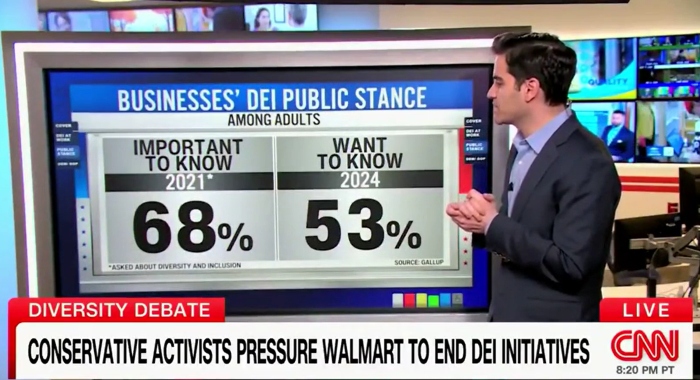Members of the media elite are scrambling to explain the dramatic shift of Americans away from the Democratic Party. On Monday, CNN’s Harry Enten weighed in, citing the reversal of DEI policies by some of the nation’s top corporations as evidence that voters are growing frustrated with virtue signaling and the heavy-handed tactics of the PC police.
On Tuesday, Walmart became the latest Fortune 500 company to announce it would scale back DEI initiatives, many of which were introduced during the 2020 Black Lives Matter protests. Enten explained that these changes align with the broader sentiment among Americans regarding corporate social justice. When asked about public opinion on DEI in boardrooms, the CNN analyst highlighted a significant decline in support for such initiatives over the past year.
In 2021, one year after the death of George Floyd, 68% of Americans told pollsters they felt it was “somewhat” or “very” important to know the DEI stances of businesses. Today that number allegedly stands at 53%, though President-elect Donald Trump’s resounding victory and the country’s dramatic shift to the right suggest that number could actually be far lower. “Back then, there was a lot of interest in DEI, a lot of interest in folks knowing businesses’ stances toward DEI. Now, considerably less so,” said Enten. “You don’t see this kind of drop unless there’s a real change in public opinion.”
The decline in concern for diversity, equity, and inclusion (DEI) policies is largely driven by a decrease in interest among Republicans. Three years ago, 86% of Democrats and 50% of Republicans believed it was important to consider the DEI policies of corporations before making purchasing decisions. However, those figures have now fallen to 79% for Democrats and just 22% for Republicans, Enten explained. While Democratic support for DEI has remained relatively steady, Republican support has decreased by more than half. “That, of course, is mirroring what we’re seeing from politicians, from Republicans, folks like Donald Trump. The bottom line is Republicans on DEI, three years ago were kind of lukewarm, and are now in vast opposition to it. They don’t want to hear anything from businesses on DEI, and I think that’s why you hear a lot of businesses saying ‘you know what, we’re taking a step back.’”
WATCH:
Walmart’s reversal comes after a growing number of companies have reconsidered or completely rolled back their DEI initiatives in response to public backlash. Businesses serving rural communities, like John Deere and Tractor Supply, have been particularly affected, but major retailers such as Target have also felt the impact. This week, Target reported a sharp decline in quarterly revenue, with CEO Brian Cornell attributing the drop to “negative guest reaction to our Pride collection.” The controversy began in the summer of 2023, when conservatives voiced concerns over the company selling LGBT-themed clothing and outdoor gear for young children.
The growing backlash against DEI has also affected the Democratic Party at its highest levels. Massachusetts Congressman Seth Moulton (D-MA) sparked controversy less than a week after the election when he publicly voiced his discomfort with the mandate requiring public schools to allow transgender girls to compete alongside his daughters. While LGBT activists condemned the statement as transphobic, it also became a key moment in the party’s internal debate over how to balance the interests of smaller, more vocal segments of the electorate without alienating the broader American public.



